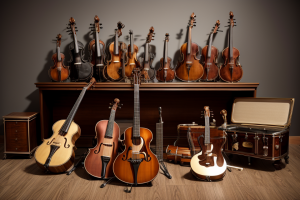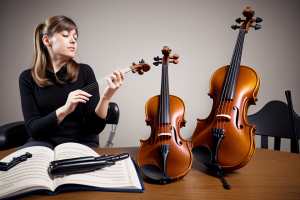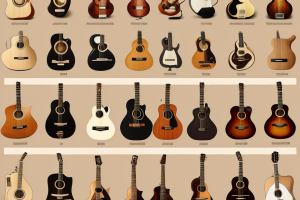
Playing an instrument is not just about creating beautiful music, it’s also a journey of self-discovery and personal growth. It’s a unique experience that teaches you valuable life lessons that you can carry with you throughout your life. From learning patience and discipline to building confidence and creativity, playing an instrument has a wealth of benefits that go beyond the realm of music. So, let’s dive into the fascinating world of playing an instrument and explore the life lessons that it has to offer.
Playing an instrument can teach you valuable life lessons, such as discipline, patience, and perseverance. Learning to play an instrument requires dedication and practice, and it can be a challenging process that requires you to overcome obstacles and setbacks. However, with hard work and determination, you can achieve your goals and improve your skills. Additionally, playing an instrument can help you develop a sense of creativity and self-expression, as you learn to express yourself through music. Overall, playing an instrument can be a rewarding and enriching experience that can help you grow as a person and develop important life skills.
Learning an instrument can improve cognitive abilities
Playing an instrument can have a positive impact on cognitive abilities, such as memory, attention, and spatial reasoning. Here are some ways in which playing an instrument can improve cognitive abilities:
- Memory: Learning to play an instrument requires memorizing music sheets, chords, and rhythms. This repetition and memorization process can improve short-term and long-term memory, making it easier to retain new information in other areas of life as well.
- Attention: Playing an instrument requires focused attention on the instrument and the music being played. This sustained attention can improve overall concentration and help develop the ability to filter out distractions, leading to better performance in school or work.
- Spatial reasoning: Playing an instrument requires understanding and manipulating the relationship between different elements, such as notes, rhythms, and melodies. This can improve spatial reasoning abilities, which are important for problem-solving and critical thinking.
- Multitasking: Playing an instrument requires multitasking, as musicians must coordinate their hands, eyes, and ears to play the instrument and follow the music. This can improve the ability to multitask and prioritize tasks, leading to better time management and productivity.
Overall, playing an instrument can enhance cognitive abilities, leading to better academic and professional performance, as well as overall brain health and well-being.
Improving memory
- Playing an instrument requires memorizing music notes and sequences
- This enhances short-term and long-term memory
- Musical training has been linked to better academic performance
- Improved memory aids in learning other skills and tasks
- Repetition and practice help solidify memory of music and techniques
- Consistent practice builds muscle memory and automates movements
- Regular review and repetition reinforces memory of music and skills
- Memory improvement extends beyond music to overall cognitive function
- Improved memory aids in retaining information and learning new skills
- Enhanced cognitive abilities can lead to personal and professional growth
- This enhances short-term and long-term memory
Enhancing focus and attention
Playing an instrument requires sustained attention and concentration. This means that musicians must focus on their instrument and the music they are playing for extended periods of time. This type of focused attention can have a positive impact on other areas of life. Musicians often report that their ability to concentrate has improved since they started playing an instrument.
In addition to improving focus and attention, playing an instrument can also enhance multitasking skills. Musicians often have to coordinate their instrument playing with other musicians, which requires them to switch between different tasks quickly and efficiently. This type of task switching can improve overall cognitive flexibility and enhance the ability to multitask in other areas of life.
Research has shown that playing an instrument can lead to changes in the brain that improve cognitive abilities. For example, a study published in the journal Neuropsychology, Development, and Cognition B found that children who received music lessons had better working memory and inhibitory control than those who did not receive lessons.
Overall, playing an instrument can have a positive impact on cognitive abilities, including focus and attention, multitasking, and working memory. These skills can be useful in many areas of life, from school and work to personal relationships and leisure activities.
Boosting creativity
Playing an instrument has been shown to enhance creativity in individuals. Here are some ways in which playing an instrument can boost creativity:
- Self-expression and creativity: Playing an instrument allows individuals to express themselves creatively. This can be done through improvisation, composition, or even playing covers of songs. By experimenting with different notes, rhythms, and styles, musicians can explore their own unique voice and style.
- New ideas and innovative thinking: The process of creating music can lead to new ideas and innovative thinking. When musicians are presented with a problem or challenge, they may approach it from a different perspective than someone who has not had exposure to music. This can lead to unique solutions and ideas.
- Increased openness to new experiences: Musical training has been linked to increased openness to new experiences. This means that musicians are more likely to be open to trying new things and taking risks. This can be beneficial in all areas of life, not just in music.
Overall, playing an instrument can provide numerous benefits for cognitive development, including boosting creativity. Whether you are a beginner or an experienced musician, playing an instrument can help you tap into your creative potential and develop new ideas.
Playing an instrument can enhance social skills
Learning to play an instrument can help develop social skills that can benefit individuals in various aspects of their lives. Playing an instrument in a group or band setting requires effective communication, cooperation, and teamwork. These skills can be transferred to other areas such as work, school, and personal relationships.
Effective Communication
Playing an instrument requires clear communication between band members. Musicians must be able to convey their ideas and instructions to others in a concise and understandable manner. This helps develop effective communication skills that can be applied in other areas of life.
Cooperation and Teamwork
Playing an instrument in a group or band setting requires cooperation and teamwork. Musicians must work together to create a cohesive sound and ensure that each member is playing their part correctly. This helps develop skills such as listening, compromising, and adapting to different personalities and playing styles.
Confidence and Self-Expression
Playing an instrument can also help build confidence and self-expression. Musicians must be able to express themselves through their instrument and perform in front of an audience. This can help individuals develop their self-confidence and learn to express themselves in a variety of situations.
Problem-Solving and Critical Thinking
Playing an instrument also requires problem-solving and critical thinking skills. Musicians must be able to identify and solve issues that arise during practice or performance. This helps develop skills that can be applied to other areas of life, such as work and school.
Overall, playing an instrument can provide numerous benefits beyond just learning to play music. It can help individuals develop valuable social skills that can enhance their personal and professional lives.
Building confidence
- Playing an instrument in front of others can be a scary experience
- Performing in front of others requires a certain level of vulnerability, as musicians expose themselves to the judgement of others through their music.
- However, with practice, musicians can build confidence and overcome stage fright
- Consistent practice allows musicians to become more comfortable with their instruments and more confident in their abilities.
- Overcoming stage fright can also boost overall confidence, as it requires musicians to confront their fears and push through discomfort.
- This can translate to increased confidence in other areas of life
- The confidence gained from overcoming stage fright and performing in front of others can carry over into other areas of life, such as public speaking or presentations.
- Musicians learn to trust in their abilities and take risks, which can lead to greater success and fulfillment in all aspects of life.
Developing teamwork skills
Playing in a band or orchestra requires teamwork and collaboration. Musicians must work together to create a cohesive sound. This can lead to improved communication and collaboration skills.
Here are some specific ways that playing an instrument can help develop teamwork skills:
- Listening and responding to others: When playing in a group, it’s important to listen to the other musicians and respond to their cues. This requires active listening and the ability to adapt to changes in the music.
- Coordinating with others: Musicians must work together to coordinate their playing and create a cohesive sound. This requires an understanding of timing and rhythm, as well as the ability to adjust to the other musicians’ playing.
- Problem-solving: Playing in a group can also require problem-solving skills. For example, if a musician makes a mistake, they must quickly figure out how to recover and avoid disrupting the rest of the group.
- Communication: Good communication is essential for any team, and playing in a group is no exception. Musicians must communicate effectively with each other to ensure that everyone is on the same page. This can involve verbal communication, as well as nonverbal cues such as eye contact and body language.
Overall, playing an instrument can help develop a wide range of teamwork skills that can be applied in all areas of life. By working together to create music, musicians learn how to communicate, collaborate, and problem-solve effectively.
Fostering empathy and emotional intelligence
Playing an instrument can enhance emotional intelligence
- Musicians must understand and connect with the emotions expressed in music
- This can lead to increased empathy and understanding of others
Emotional intelligence refers to the ability to recognize, understand, and manage one’s own emotions, as well as the emotions of others. Playing an instrument can help develop this skill by requiring musicians to understand and connect with the emotions expressed in music. For example, a musician playing a piece that conveys sadness must be able to empathize with the emotions expressed in the music and convey them through their performance.
Furthermore, playing an instrument can also enhance a musician’s ability to recognize and understand the emotions of others. This is because music is a form of expression that can convey a wide range of emotions, and playing an instrument requires the musician to listen carefully to the music and interpret its meaning. By doing so, musicians can develop a deeper understanding of the emotions expressed in music and transfer this understanding to their interactions with others.
In conclusion, playing an instrument can enhance emotional intelligence by requiring musicians to understand and connect with the emotions expressed in music. This can lead to increased empathy and understanding of others, which are valuable skills in any social context.
Playing an instrument can improve physical health
Playing an instrument has numerous physical benefits that can improve one’s overall health. Some of these benefits include:
- Improved fine motor skills: Playing an instrument requires the use of fine motor skills, which can help improve hand-eye coordination and dexterity.
- Increased lung capacity: Playing wind instruments such as the saxophone or trumpet can increase lung capacity and improve overall respiratory health.
- Strengthened muscles: Playing an instrument can help strengthen the muscles in the hands, arms, and shoulders, leading to improved physical abilities in other areas of life.
- Better posture: Holding an instrument properly can help improve posture, reducing the risk of back pain and other posture-related issues.
- Reduced stress: Playing an instrument has been shown to reduce stress levels, leading to a healthier mind and body.
These physical benefits can have a positive impact on overall health and well-being, making playing an instrument a great way to improve one’s quality of life.
Enhancing fine motor skills
Playing an instrument requires precise movements of the hands and fingers, which can improve fine motor skills and hand-eye coordination. This can have a positive impact on physical health and can even improve performance in sports and other activities.
One of the most significant benefits of playing an instrument is the improvement of fine motor skills. The constant repetition of specific movements required to play an instrument can help to develop the muscles in the hands, fingers, and arms. This can lead to improved dexterity and coordination, which can have a positive impact on overall physical health.
Playing an instrument can also help to improve hand-eye coordination, which is the ability to coordinate the movement of the hands with the eyes. This is an essential skill for many activities, including sports, driving, and even everyday tasks such as cooking or cleaning. By regularly practicing an instrument, individuals can improve their hand-eye coordination, which can have a positive impact on their overall physical health and well-being.
Moreover, the benefits of playing an instrument go beyond physical health. Musical training has been linked to improved performance in sports and other activities. This is because playing an instrument requires focus, discipline, and dedication, all of which can be applied to other areas of life. As a result, playing an instrument can be an excellent way to develop important life skills such as time management, self-discipline, and goal-setting.
In conclusion, playing an instrument can have a positive impact on physical health by enhancing fine motor skills and hand-eye coordination. It can also help to develop important life skills that can be applied to other areas of life. Whether you are a beginner or an experienced musician, playing an instrument can be a rewarding and enriching experience that can have a lasting impact on your physical and mental well-being.
Boosting cardiovascular health
Playing an instrument can be a physically demanding activity that requires a significant amount of coordination, dexterity, and stamina. As a result, it can provide numerous benefits for cardiovascular health. Studies have shown that regular musical training can lead to lower blood pressure, improved heart health, and a stronger cardiovascular system.
One of the main ways in which playing an instrument can boost cardiovascular health is through increased aerobic capacity. This is because playing an instrument often involves sustained periods of physical activity, such as holding and moving the instrument, pressing keys or buttons, and manipulating strings or drumsticks. This repetitive movement can increase endurance and improve overall fitness levels.
In addition to aerobic benefits, playing an instrument can also help to improve cardiovascular health by reducing stress levels. Music has been shown to have a calming effect on the body, which can help to lower blood pressure and reduce the risk of cardiovascular disease. Playing an instrument can also provide a form of emotional expression that can help individuals to manage stress and anxiety more effectively.
Moreover, playing an instrument can improve cardiovascular health by promoting overall physical activity. Musicians are often required to practice for extended periods of time, which can encourage individuals to remain active and engaged in physical activity. This can lead to a more active lifestyle, which is essential for maintaining good cardiovascular health.
Overall, playing an instrument can provide numerous benefits for cardiovascular health. By improving aerobic capacity, reducing stress levels, and promoting overall physical activity, musical training can help individuals to lead a healthier, more active lifestyle.
Reducing stress and anxiety
Playing an instrument can be a powerful tool for reducing stress and anxiety. This is because music has a unique ability to calm the mind and body, allowing individuals to escape from the stresses of daily life.
When you play an instrument, your brain releases endorphins, which are natural chemicals that promote feelings of happiness and well-being. This can help to reduce feelings of stress and anxiety, making it easier to relax and unwind.
In addition, playing an instrument can help to improve your focus and concentration. This can be especially helpful if you are feeling overwhelmed by your thoughts and emotions. By focusing on the instrument and the music, you can shift your attention away from your worries and into a more positive and productive activity.
Playing an instrument can also provide a sense of accomplishment and pride. As you learn and master new songs, you may feel a sense of pride and achievement. This can help to boost your confidence and self-esteem, which can in turn help to reduce feelings of anxiety and stress.
Overall, playing an instrument can be a valuable tool for reducing stress and anxiety. Whether you are looking to escape from the stresses of daily life or improve your mental health and well-being, playing an instrument can provide a number of benefits.
Playing an instrument can teach valuable life skills
Learning to play an instrument can provide a range of valuable life skills that extend beyond musical abilities. These skills can be applied to various aspects of life, enhancing personal growth and development. Some of the key life skills that can be learned from playing an instrument include:
- Discipline: Playing an instrument requires consistent and dedicated practice. Developing the discipline to regularly practice and hone skills can transfer to other areas of life, such as time management, goal setting, and commitment.
- Patience: Mastering an instrument takes time and patience. Learning to play a new piece or overcome challenging sections requires persistence and the ability to accept setbacks without becoming discouraged. These qualities can foster resilience and perseverance in life’s many endeavors.
- Creativity: Exploring different genres and styles of music while playing an instrument can nurture creativity and innovative thinking. The freedom to express oneself through music can encourage individuals to think outside the box and find unique solutions to problems.
- Collaboration: Playing in a band or orchestra requires teamwork and cooperation. Understanding the importance of listening, communicating, and working together towards a common goal can enhance interpersonal skills and foster a sense of community.
- Adaptability: Learning to play an instrument often involves adapting to different musical styles, genres, and even playing with different musicians. This flexibility can translate to life, where being open to change and embracing new experiences is crucial for personal growth.
- Responsibility: Taking care of an instrument (e.g., tuning, maintaining, and transporting) teaches the importance of responsibility and accountability. Ensuring that the instrument is ready for practice and performances demonstrates reliability and commitment.
- Focus: Playing an instrument requires concentration and focus. Mastering complex pieces or improvising demands a sharp mind and the ability to block out distractions. This mental discipline can enhance productivity and effectiveness in other areas of life.
- Confidence: As skills improve and progress is made, a sense of accomplishment and confidence can develop. Playing in front of an audience or sharing one’s talent with others can boost self-esteem and inspire a willingness to take on new challenges.
In conclusion, playing an instrument can offer a wealth of life lessons that extend beyond the realm of music. Developing discipline, patience, creativity, collaboration, adaptability, responsibility, focus, and confidence can all contribute to personal growth and enhance life skills that are valuable in any context.
Developing discipline and perseverance
Playing an instrument requires a significant amount of time and effort. It is not something that can be mastered overnight. Musicians must practice regularly, sometimes for hours a day, in order to improve their skills. Along the way, they will encounter obstacles and challenges that must be overcome. Learning to play an instrument therefore requires a great deal of discipline and perseverance.
Discipline is essential in order to establish a regular practice routine and to make progress. It is easy to become distracted or to put off practice in favor of other activities. However, musicians must be willing to commit to their instrument and to prioritize their practice time. This discipline can translate to other areas of life, helping individuals to develop a strong work ethic and to achieve their goals.
Perseverance is also crucial in the face of obstacles and setbacks. Learning to play an instrument can be frustrating at times, especially when progress seems slow or difficult. Musicians must be willing to persevere through these challenges, to keep practicing and to keep working towards their goals, even when it is difficult. This can help to build resilience and determination, skills that are valuable in all areas of life.
Overall, learning to play an instrument can provide valuable lessons in discipline and perseverance. By committing to regular practice and pushing through obstacles, musicians can develop important life skills that will serve them well in all areas of their lives.
Enhancing problem-solving skills
Playing an instrument can be a challenging task that requires a lot of problem-solving skills. Musicians must figure out how to play difficult passages or troubleshoot equipment issues, which can be quite frustrating at times. However, with perseverance and dedication, playing an instrument can lead to improved problem-solving skills in other areas of life.
Here are some ways in which playing an instrument can enhance problem-solving skills:
- Developing a growth mindset: Learning to play an instrument requires a lot of practice and patience. It can be frustrating when things don’t go as planned, but musicians must learn to persevere and keep trying. This process helps develop a growth mindset, which is the belief that skills and abilities can be developed through hard work and dedication. A growth mindset can be applied to other areas of life, such as work or personal relationships.
- Breaking down complex tasks: Playing an instrument involves breaking down complex tasks into smaller, more manageable pieces. For example, learning to play a difficult piece of music requires breaking it down into smaller sections and practicing each section separately. This process can be applied to other areas of life, such as work projects or personal goals.
- Identifying patterns: Musicians must learn to identify patterns in music, such as rhythms, melodies, and harmonies. This skill can be applied to other areas of life, such as identifying patterns in data or recognizing patterns in social situations.
- Developing creative solutions: Sometimes, there is no one “right” way to play a particular piece of music. Musicians must develop creative solutions to overcome challenges and find their own unique way of playing a piece. This skill can be applied to other areas of life, such as problem-solving at work or finding creative solutions to personal challenges.
Overall, playing an instrument can help develop valuable problem-solving skills that can be applied to other areas of life. By learning to persevere, break down complex tasks, identify patterns, and develop creative solutions, musicians can become better problem-solvers and more resilient individuals.
Fostering a growth mindset
Playing an instrument can help individuals develop a growth mindset, which is the belief that one’s abilities can be improved through dedication and hard work. This mindset is particularly important for musicians, who must constantly strive to improve their skills in order to progress.
Here are some ways in which playing an instrument can foster a growth mindset:
- Embracing challenges: Learning to play an instrument can be challenging, and musicians must be willing to embrace these challenges in order to improve. Whether it’s mastering a difficult piece of music or practicing a tricky technique, musicians must be willing to push themselves outside of their comfort zones in order to grow.
- Receiving feedback: Musicians must be open to feedback from others, whether it’s from a teacher, a fellow musician, or an audience member. This feedback can be difficult to hear, but it’s essential for growth and improvement. Musicians must learn to take feedback constructively and use it to inform their practice and performance.
- Practicing consistently: Improving as a musician requires consistent practice over a long period of time. Musicians must be willing to put in the time and effort to see progress, even when it may not be immediately apparent. This persistence and dedication can translate to other areas of life as well.
- Celebrating small victories: Progress as a musician often comes in small increments, rather than large leaps. Musicians must learn to celebrate these small victories and recognize the progress they’ve made, even if it’s not always visible to others. This mindset can help individuals maintain motivation and perspective in the face of challenges.
Overall, playing an instrument can help individuals develop a growth mindset by encouraging them to embrace challenges, receive feedback, practice consistently, and celebrate small victories. These skills can have a positive impact on all areas of life, helping individuals to become more resilient, adaptable, and successful.
FAQs
1. What are the benefits of playing an instrument?
There are many benefits to playing an instrument, including improved cognitive skills, increased coordination and dexterity, and enhanced creativity. Playing an instrument can also provide a sense of accomplishment and self-expression, and can be a valuable form of stress relief.
2. Can playing an instrument help with academic performance?
Yes, playing an instrument has been shown to have a positive impact on academic performance. Studies have found that playing an instrument can improve memory, focus, and problem-solving skills, all of which can help with academic success.
3. What instruments are best for teaching life lessons?
All instruments can offer valuable life lessons, but some may be more beneficial than others depending on the individual’s goals and interests. For example, playing a string instrument like the violin or cello can teach patience and discipline, while playing a percussion instrument like the drums can teach rhythm and coordination. Ultimately, the best instrument for teaching life lessons is one that the individual is passionate about and enjoys playing.
4. How can I get started playing an instrument?
If you’re interested in playing an instrument, the best way to get started is to find a reputable music teacher or school that offers lessons for the instrument you’re interested in. You can also purchase or rent an instrument and begin practicing on your own. It’s important to start with a basic understanding of music theory and to practice regularly in order to improve your skills.







